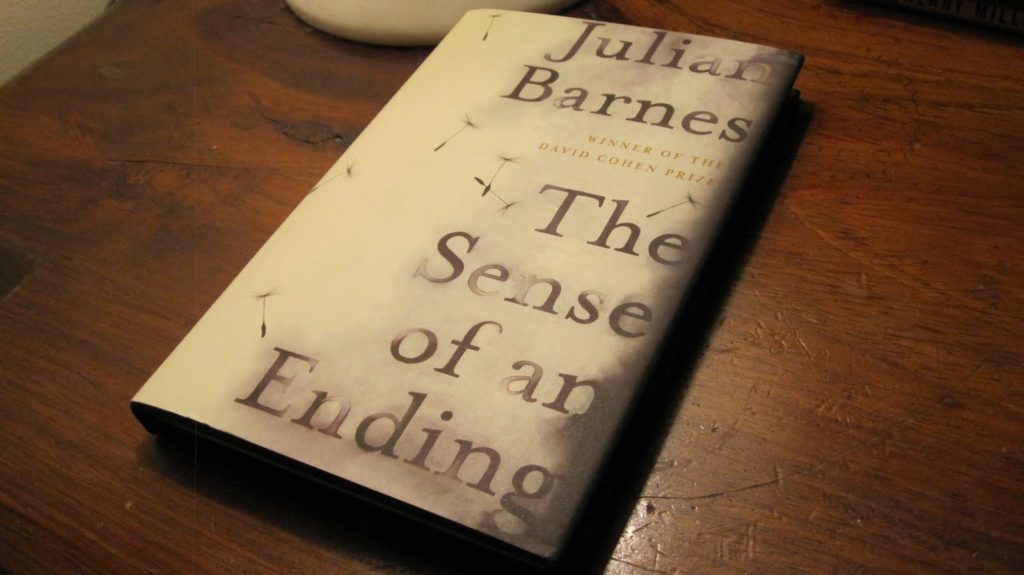The Sense of an Ending by Julian Barnes won the 2011 Booker Prize for best novel. Unlike many award winning works of literature, this is not a long dense novel. It’s a very short novel that’s easy to read, if not easy to digest. In fact, it’s so short that it’s spawned some debate that it should be classed as a novella. Regardless of the length, this novel packs a powerful punch as it tackles deep themes about living life to the fullest, the flaws of memories, emotional damage, and the nature of remorse. In addition, the ending does not neatly resolve all the puzzles but leaves the reader to use the final clues to go back and reinterpret some of the earlier events.
The Sense of an Ending is written in first person from the point of view of Tony Webster who is peacefully retired until he receives a letter with notification that he has been given a small bequest upon the death of someone he hardly knew. Tony finds himself trying to solve a couple of mysteries in regards to the bequest that bring back strong memories of his college years. As he dredges up memories of the most traumatic events from his youth he realizes that he may have to reinterpret some of these events. Tony now has to question how much of his memory was influenced by the violent emotions of youth.
With a first person retelling, it’s always a given that the viewpoint is subject to the biases and limitations of the narrator. However, this novel emphasizes more than most the unreliable nature of the narrator who comes to realize, himself, that some of his memories are not accurate. As the narrative unfolds, it clearly demonstrates how memories are strongly influenced by a person’s emotions and prejudices of the time.

As Tony recounts his past, the reader meets Tony’s best male friends and his first girlfriend named Veronica. The reader soon learns that Tony is more than a little challenged when it comes to communication. He is completely oblivious to any kind of subtleties in communication and is completely averse to bringing his emotions or feelings out into the open. I’m not sure if Tony’s extreme inability to communicate would be all that plausible in many cultures but with the traditional British upper class propensity for maintaining “reserve” at all times, Tony’s communication issues are probably not that abnormal. Veronica tells Tony more than once, “You just don’t get it, do you?” and even after this question he still doesn’t really do much to gain an understanding. It’s not any surprise that Tony’s relationship with Veronica is rocky. However, a lifetime later, Tony begins to re-examine his first love as a possible key to a mystery involving one of his best friends.
Tony is certainly not the most likeable protagonist but most readers will be able to identify with some of his hang-ups. In his youth, he is completely self-centered and doesn’t seem to be able to view any situations through the eyes of another. He is very insecure and is paranoid that everyone he meets is against him. He simply assumes that if he is uncomfortable, other people are making fun of him or are looking down on him. Occasionally, I found myself getting a little frustrated with Tony’s passivity and total lack of understanding but there was a lot of very interesting psychology in regards to Tony and his relationships.
As Tony approaches the twilight of his life, he starts to reexamine what kind of life he has led and the major decisions he’s made. He’s always taken the path of least resistance and generally avoided confrontations. Now, he wonders if taking the “safe” path his whole life was really the best way to live.

The Sense of an Ending is written in a very lean manner with no worries about getting sidetracked into excessively long descriptions. Barnes doesn’t waste any extra words explaining what’s happening. He leaves it up to the reader to interpret the events and conversations. This continues right through to the ending which may be a bit too open ended for some readers. At the end, Tony makes a major discovery which reveals more clues about the central mysteries of the novel. However, Barnes does not come out and tie everything together. The reader is left to go back through the events and dialogs in order to resolve the mysteries. Rereading passages is going to be a must for all readers and many will want to completely reread the novel. I easily spent an hour or two rereading passages, sometimes multiple times, before I was mostly satisfied that I had come to understand what had really happened. For those of you who want to read what others have deduced in regards to the ending of the novel, there are many discussion blogs on the web or you can read my harebrained explanations. However, I can’t emphasize enough that you don’t want to read any of these “spoilers” prior to first reading the novel.
I give this novel my highest recommendation for readers in their 30s or older. On the other hand, younger readers may also find a lot to think about. For a brilliantly well written ultra lean novel that provides a fascinating look at memories, emotions, and unintended consequences along with challenging puzzles, The Sense of an Ending is a must read. You will be thinking about the many aspects of this novel for days, if not weeks, afterwards.




